Overview
The article highlights a common challenge faced by startups: the struggle to establish a strong identity in a competitive landscape. This can lead to a disconnect with audiences, leaving companies feeling lost and unrecognized. However, there is hope. By examining ten inspiring business mission statements from various startups, we can see how these powerful declarations can guide companies in fostering meaningful connections with their audiences.
Each example serves as a reminder of the necessity to align a company's purpose with the values of its customers. Themes such as sustainability, empowerment, and emotional engagement emerge as vital components in this journey. These elements are not just buzzwords; they are essential for cultivating loyalty and driving growth. When startups embrace these principles, they not only enhance their identity but also nurture a community around their brand.
As you reflect on your own mission, consider how these insights can shape your approach. Sharing your purpose can resonate deeply with your audience, inviting them to join you on your journey. Remember, you are not alone in this endeavor. Together, we can explore the transformative power of mission statements and their role in building a brighter future for your startup.
Introduction
In a landscape where many startups find it challenging to define their identity, the significance of a well-crafted mission statement truly shines. These guiding declarations act not only as a compass for decision-making but also as a welcoming beacon that draws in customers and nurtures loyalty.
By reflecting on inspiring examples from established brands like RNO1, Microsoft, and Patagonia, startups can discover the essential elements of impactful mission statements that resonate deeply with their audience.
What challenges do these companies overcome through their missions? More importantly, how can emerging businesses embrace similar strategies to flourish in a competitive market? This exploration is not just about survival; it’s about thriving together in the journey ahead.
RNO1: Creating Radical Digital Experiences for Modern Brands
In today's fast-paced digital world, many brands struggle to create . This challenge can lead to feelings of frustration and isolation, as the gap between brands and consumers widens. RNO1 understands these pain points deeply and is committed to addressing them through its purpose statement: 'Creating for Modern Brands.' This mission reflects a nurturing approach to redefining digital branding, focusing on innovative solutions that meet the evolving needs of contemporary companies.
By positioning itself as a leader in digital growth, RNO1 not only embodies its core values but also serves as a supportive partner for . The agency's dedication to is evident in its ability to . In a landscape where , RNO1 recognizes that connecting with audiences on a deeper level is essential.
Through its focus on , RNO1 offers a compassionate solution for brands seeking to bridge the gap with their customers. By prioritizing empathy and understanding in their strategies, they create an environment where brands can thrive and resonate with their audiences. RNO1 invites you to join them on this journey, as they work together to that lead to lasting success.
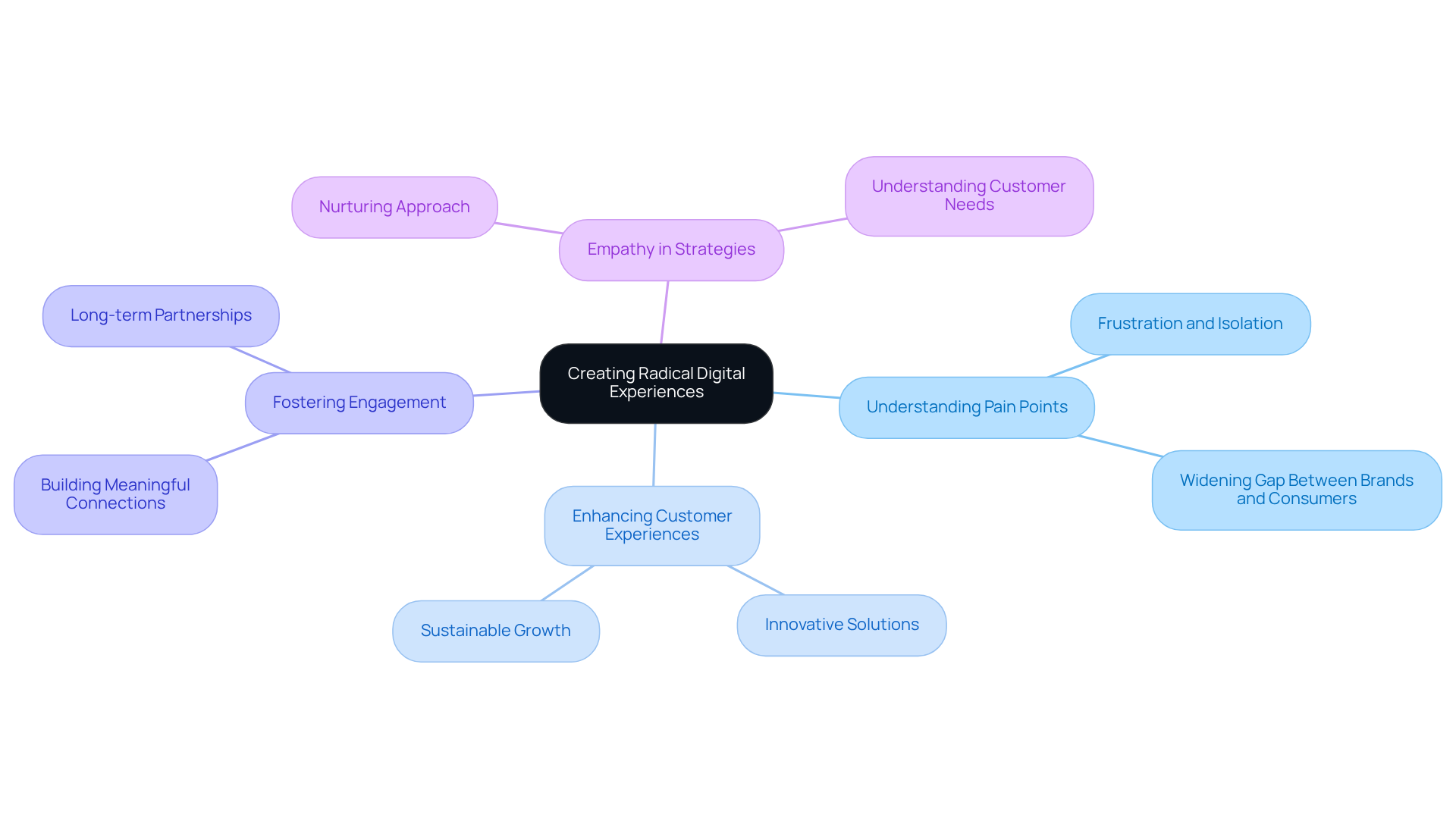
Microsoft: Empowering Every Person and Organization to Achieve More
In today's fast-paced world, many startups grapple with the challenge of inclusivity and innovation. It's a common struggle, as they often wonder how to create products or services that truly . This concern is not just a minor hurdle; it can significantly and .
As Bill Gates wisely noted, 'As we look ahead into the next century, leaders will be those who empower others.' This insight underscores the in building a brand that resonates with diverse groups. Microsoft’s purpose, ',' serves as a shining example of this principle in action.
By focusing on empowerment, Microsoft has cultivated a brand that inspires startups to consider their own . This nurturing approach not only fosters a sense of community but also drives engagement and loyalty among customers.
The success of this strategy is evident, as seen in Microsoft's remarkable record revenues of $73 billion in fiscal year 2012. Their journey illustrates how an emphasis on empowerment enables a company to adapt to changing market conditions and user needs. It's a powerful reminder that a guiding statement advocating for inclusivity and innovation can pave the way for and a supportive environment for all.
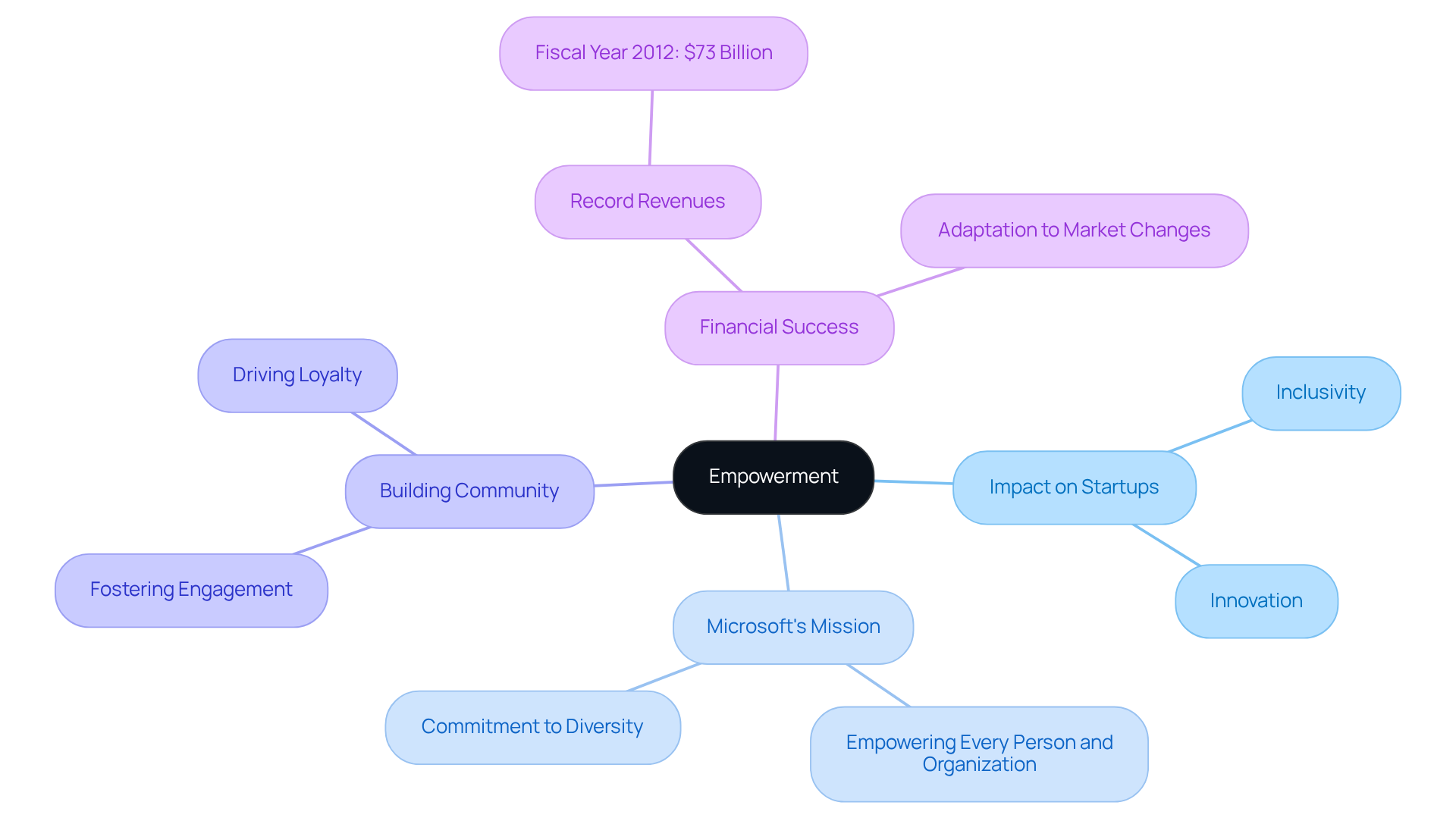
Patagonia: In Business to Save Our Home Planet
Patagonia's purpose, 'In Business to Save Our Home Planet,' highlights a deep commitment to that resonates with eco-. This mission not only shapes the company's identity but also serves as a beacon for customers who value . A survey reveals that 79% of consumers who notice sustainability messages tend to trust these communications, underscoring the importance of . By aligning their values with those of their target audience, Patagonia nurtures loyalty among a growing demographic of conscious consumers.
Startups can draw valuable lessons from Patagonia's approach by looking at that highlight a genuine . This alignment not only enhances but also fosters enduring relationships with customers increasingly driven by sustainability in their purchasing choices.
To harness these insights, startups should consider , thereby resonating with the values of their target audience and creating a meaningful connection.
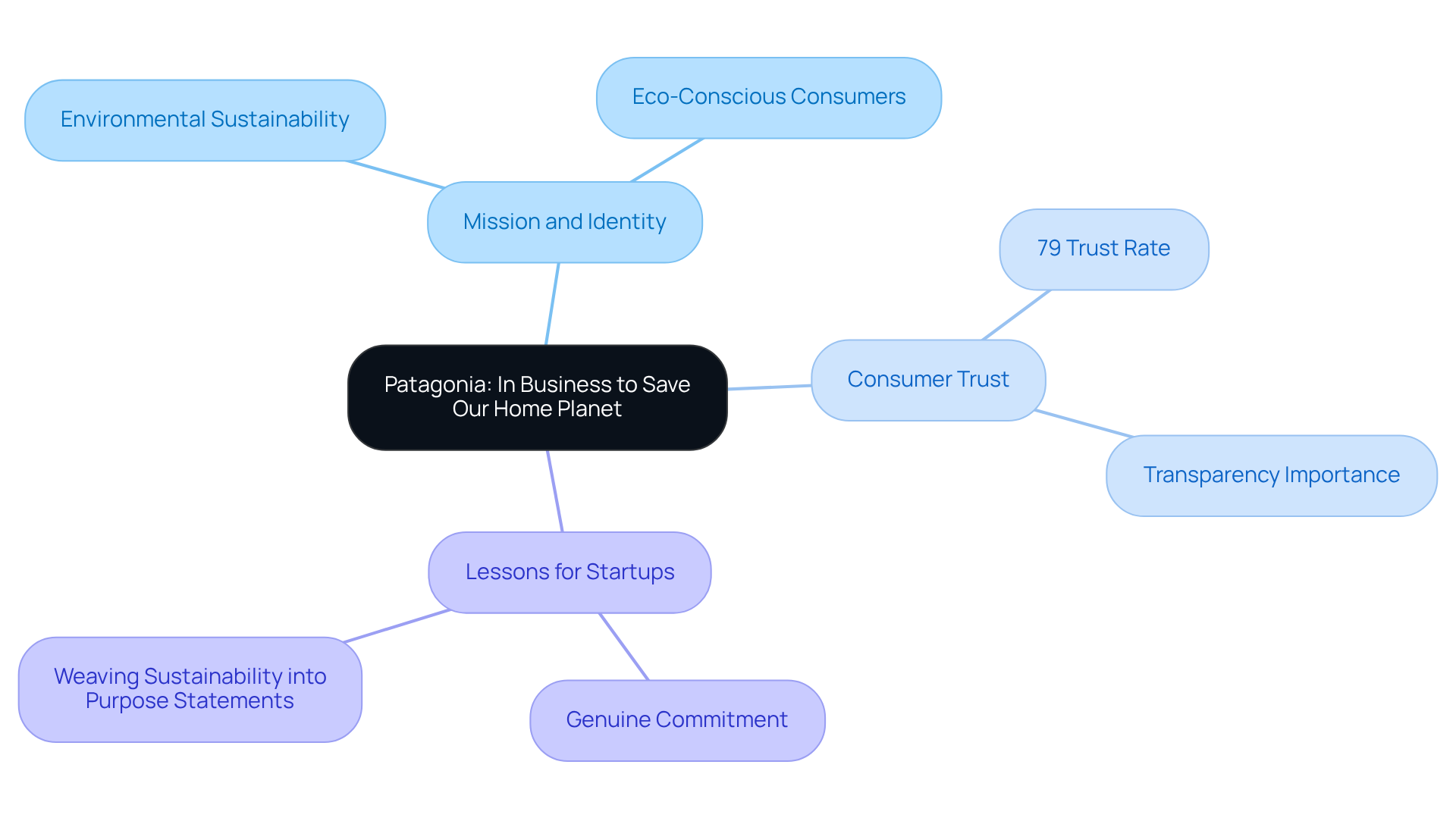
Tesla: Accelerating the World's Transition to Sustainable Energy
In today's world, many startups grapple with the challenge of establishing a with the growing consumer demand for sustainability. This struggle can leave founders feeling overwhelmed and uncertain about how to position their brands effectively. However, there is hope. Tesla's objective, 'Accelerating the World's Transition to ,' stands as a shining example of , positioning the company as a leader in the electric vehicle market. This commitment not only drives Tesla's product development but also nurtures a devoted community of supporters and investors who share its vision.
Startups can find inspiration in Tesla's journey by developing that align with contemporary trends and aspirations. By doing so, they can establish themselves as progressive players in their industries. Consider how 72% of shoppers are ; this statistic highlights a significant opportunity for startups to improve their reputation and cultivate loyalty among consumers who prioritize sustainability.
Moreover, as innovation becomes increasingly vital in shaping brand identity, are more likely to attract attention and investment. as the primary method of sustainable power generation underscores the innovative spirit of Tesla's mission.
By examining business mission statements examples from successful startups, we see that those who adopt a clear and impactful purpose aligned with industry trends not only differentiate themselves but also drive meaningful growth and engagement in a competitive landscape. Sustainability can truly offer a , as businesses that are better positioned to meet consumer expectations and thrive in the market.
As you navigate this journey, remember that you are not alone. Embracing a purpose-driven approach can transform your startup into a beacon of hope and progress, inspiring others along the way.
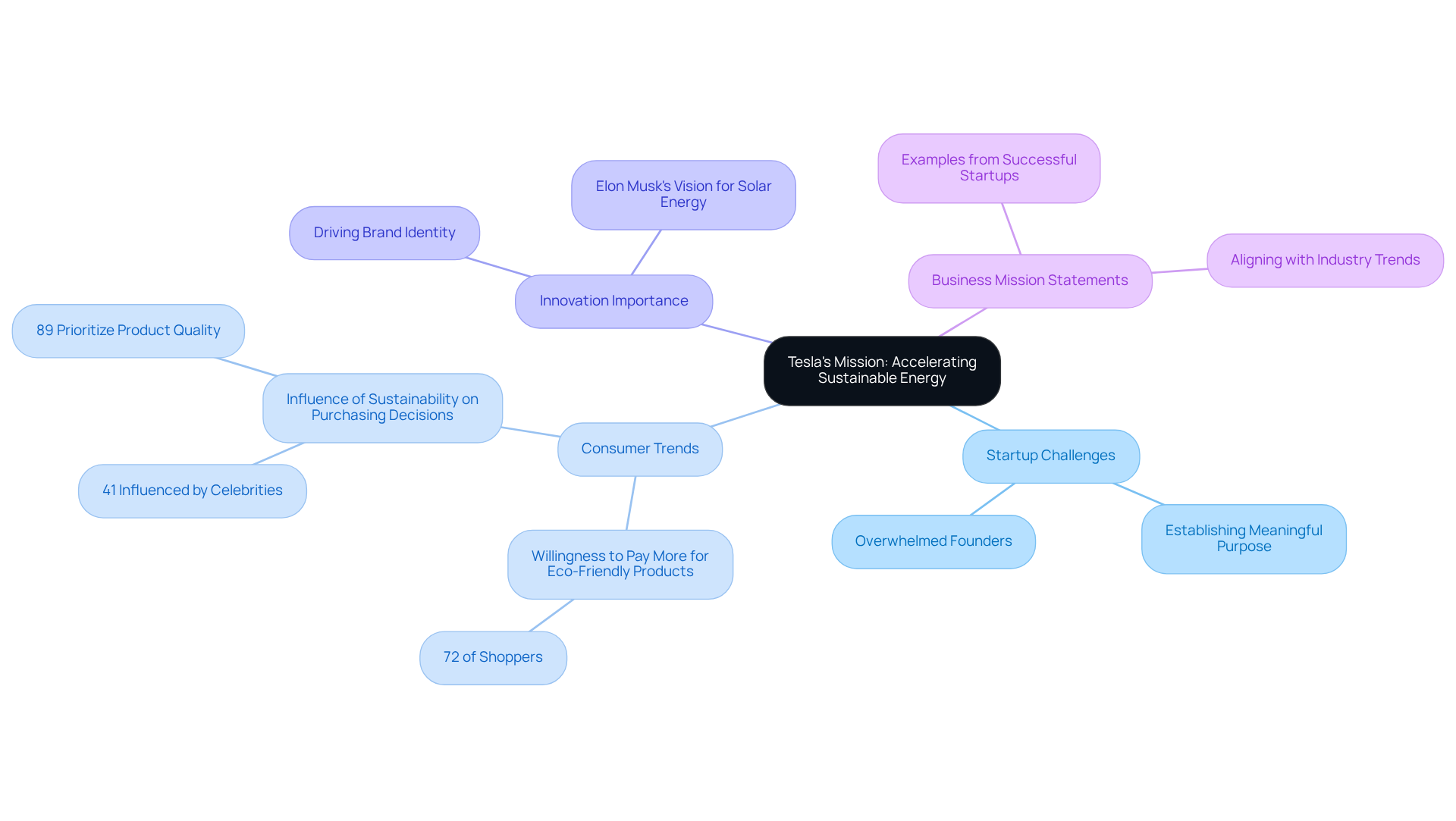
Starbucks: Inspiring and Nurturing the Human Spirit, One Cup at a Time
Starbucks' purpose, 'Inspiring and , One Cup at a Time,' reflects a deep commitment to customer experience and community engagement. This dedication not only fosters with customers but also nurtures loyalty and encourages repeat business.
Many startups face the challenge of establishing a . They may struggle to connect with their audience on a deeper level, which can lead to missed opportunities for growth and retention.
By taking cues from Starbucks, startups can understand that , when thoughtfully designed, can evoke strong feelings and create an appealing identity that resonates profoundly with their target audience.
Imagine how powerful it would be for your brand to inspire loyalty through . By prioritizing this connection, brands can significantly enhance .
Let's explore how you can in your own journey, fostering not just transactions but meaningful relationships with your customers.
, helping you see how these elements connect to create a strong brand identity.](https://images.tely.ai/telyai/wcituzyb-the-central-idea-shows-how-starbucks-inspires-loyalty-each-branch-represents-an-aspect-of-emotional-engagement-helping-you-see-how-these-elements-connect-to-create-a-strong-brand-identity.webp)
Nike: Bringing Inspiration and Innovation to Every Athlete in the World
Many tech startup founders grapple with the challenge of establishing a in a crowded market. This struggle can feel overwhelming, as it often leads to uncertainty about how to . The implications of this challenge are significant; without a clear purpose, it can be difficult to inspire both your team and your audience.
Nike's purpose, ',' serves as a beacon for what is possible. By committing to motivate individuals through groundbreaking products, Nike not only influences its marketing strategies but also nurtures a culture of creativity and excellence among its employees. Startups can learn from this approach by creating that emphasize innovation and inspiration. This focus can within their organizations, encouraging teams to think creatively and push boundaries.
Moreover, , connecting with audiences who seek authenticity and purpose in the products they support. By aligning their objectives with , startups can enhance their brand identity and foster customer loyalty. Remember, you are not alone in this journey; by embracing a purpose-driven approach, you can that resonates deeply with your audience.
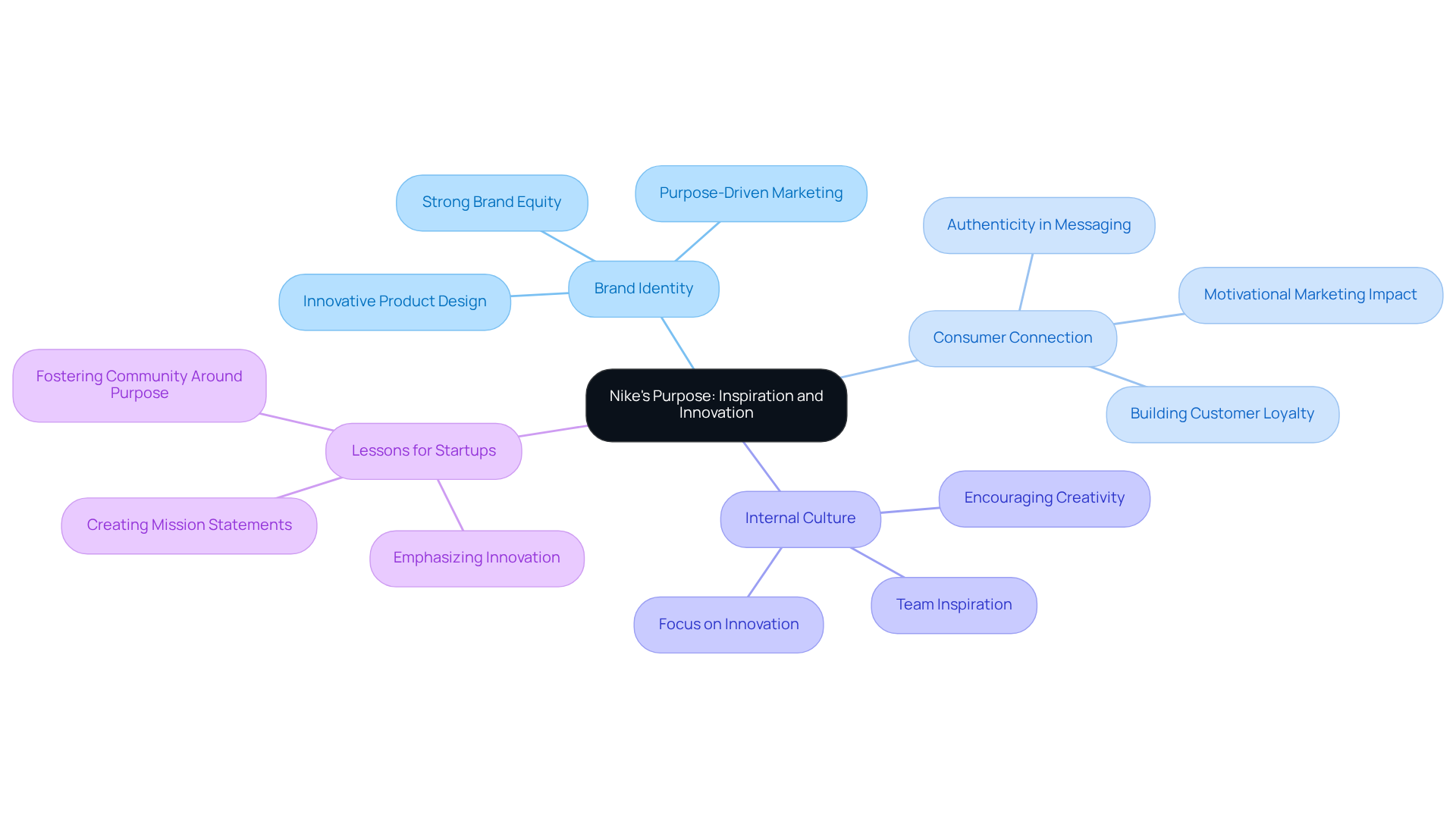
Google: Organizing the World's Information to Make It Universally Accessible and Useful
Google's objective, 'Organizing the World's Information to Make It Universally Accessible and Useful,' reflects a deep commitment to enhancing . This goal not only guides Google's product development but also shapes its marketing strategies, ensuring that user needs remain central.
Imagine the impact: Bain & Company highlights that increasing by just 5% can elevate profits by 25% to 95%. This statistic underscores the critical importance of truly .
For startups, crafting is essential for generating real value. By concentrating on accessibility and utility, businesses can create offerings that resonate with their target audience, . A for decision-making, helping startups align their strategies with user expectations and .
With 70% of consumers indicating that a affects their loyalty, it becomes vital for startups to . This alignment can significantly strengthen connections with their customers, nurturing a community built on trust and understanding.
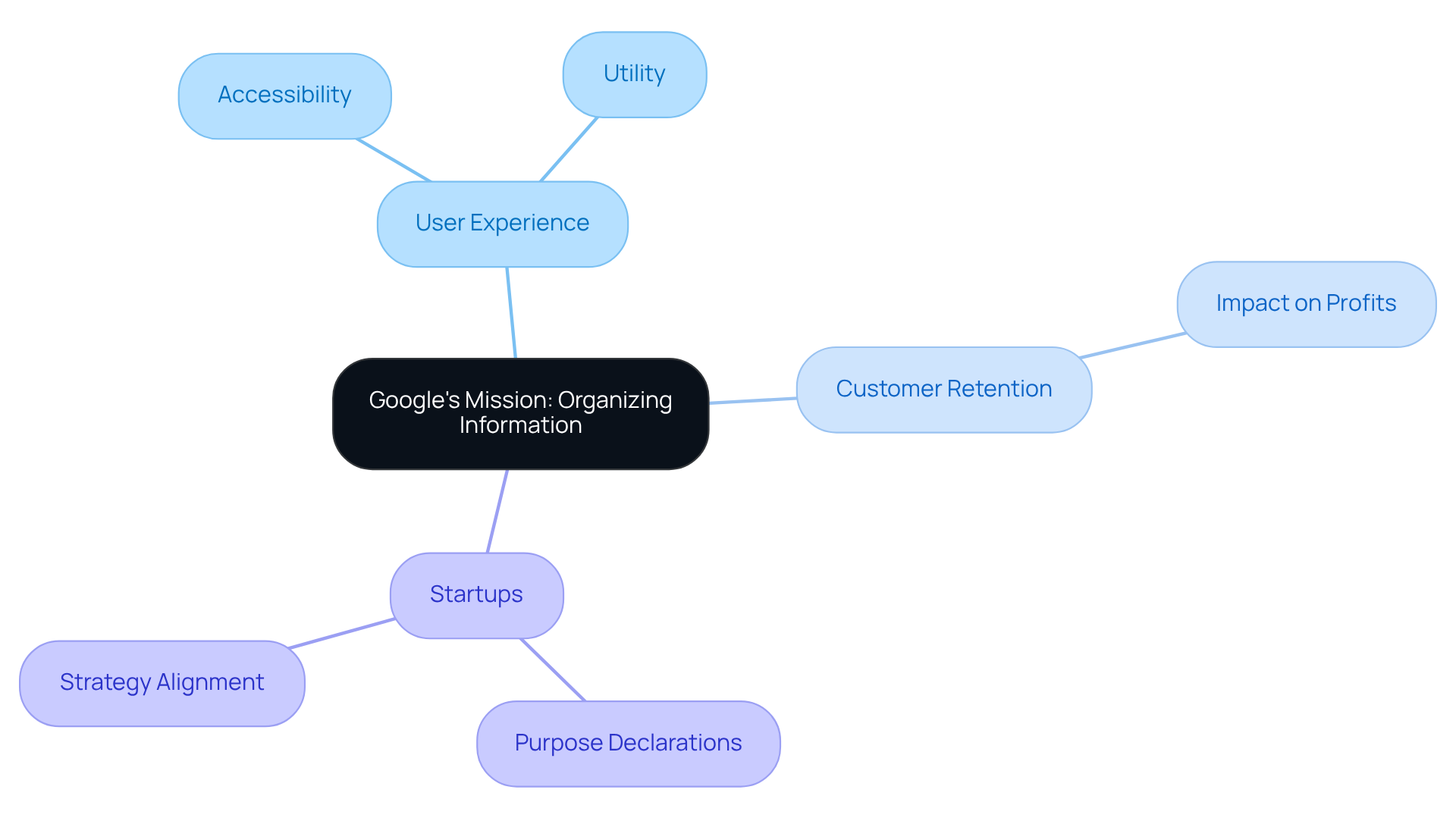
LinkedIn: Creating Economic Opportunity for Every Member of the Global Workforce
LinkedIn's purpose, 'Creating for Every Member of the Global Workforce,' beautifully exemplifies a commitment to inclusivity and professional growth. This initiative not only shapes LinkedIn's identity but also resonates with users eager to enhance their careers.
As Michelle Obama wisely noted, 'The more diverse your team members are from one another, the better decisions they’ll make on behalf of your company.' By emphasizing economic opportunity, LinkedIn attracts a , demonstrating how a thoughtfully crafted purpose can significantly enhance appeal.
For startups, there are valuable lessons to be learned from LinkedIn's approach. By , startups can foster deeper connections with potential users and clients. This strategy not only strengthens brand identity but also positions startups as advocates for , ultimately driving engagement and loyalty.
Yet, it is essential for startups to recognize the . The '' case study highlights the importance of and providing ongoing education to weave inclusivity into the . Embracing these insights can pave the way for a more , nurturing a supportive environment where everyone can thrive.
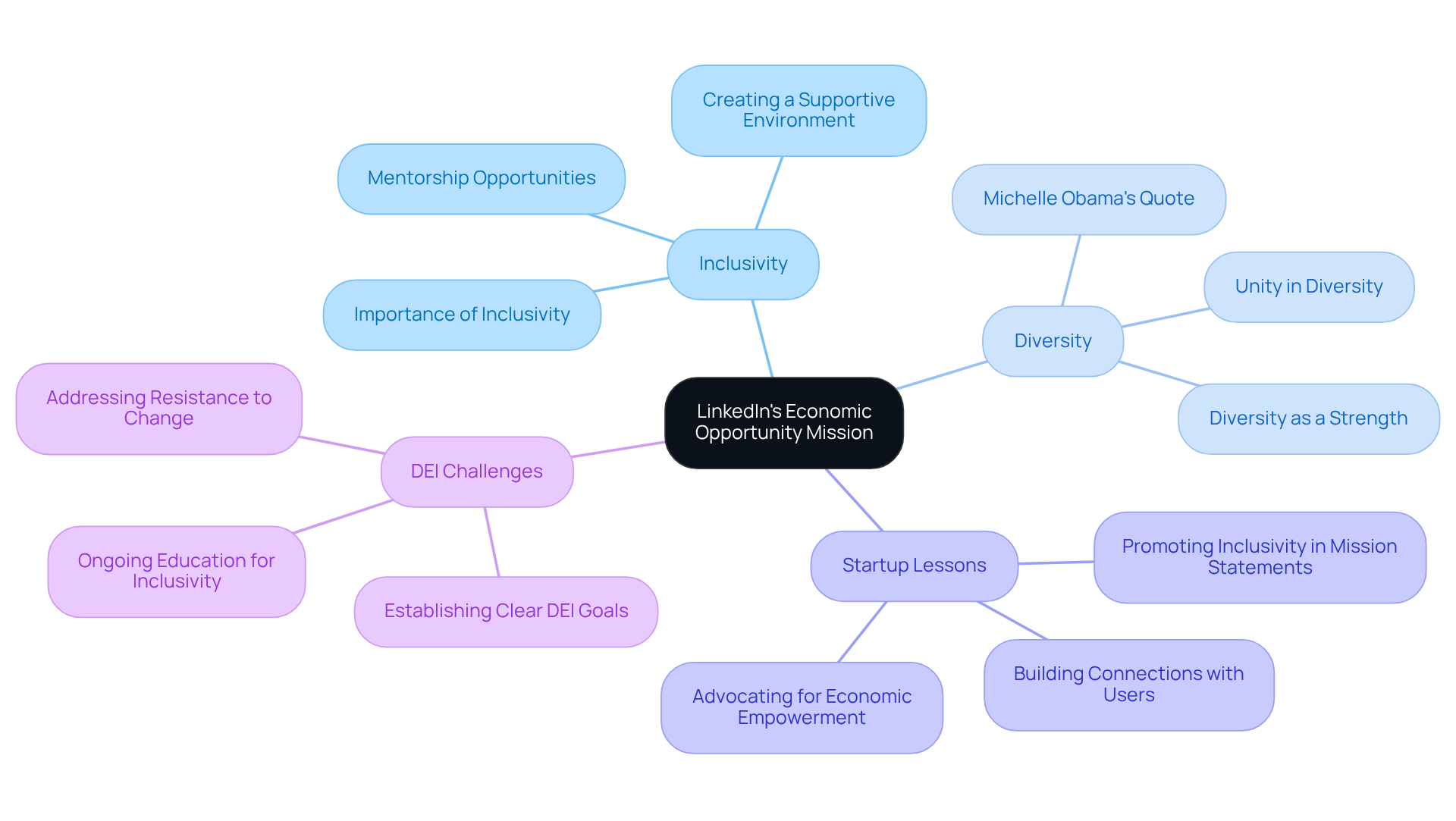
American Express: Becoming Essential to Our Customers by Providing Differentiated Products and Services
American Express's purpose, 'Becoming Essential to Our Customers by Providing ,' highlights a significant challenge many startups face: understanding and addressing . This commitment to is crucial, as it guides the development of products that resonate with their audience, fostering deep loyalty and trust.
For startups, that reflects a genuine is vital. By ensuring their offerings deliver , they can nurture strong relationships with their customers. Varied products are instrumental in this journey; they not only enhance product identity but also play a significant role in .
Companies that embrace innovation and tailor their services to meet specific customer demands often find themselves building lasting connections and driving . It’s about creating an environment where customers feel valued and understood, leading to a thriving community around their brand.
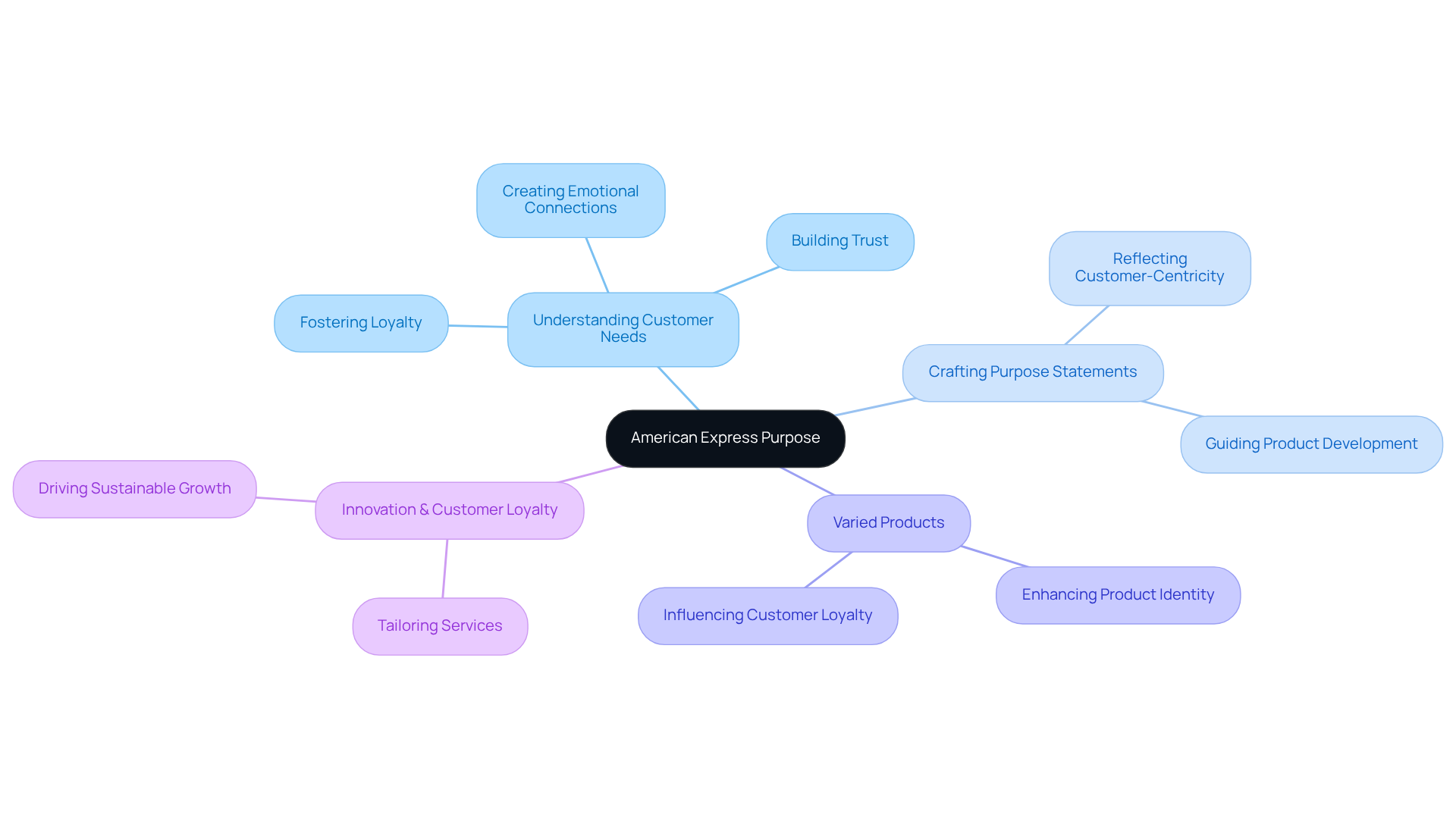
Warby Parker: To Inspire and Impact the World with Vision, Purpose, and Style
Warby Parker's goal, 'To Inspire and Impact the World with Vision, Purpose, and Style,' serves as a beacon for those seeking to make a through their products. This aspiration not only energizes employees but also resonates with customers who yearn for brands that mirror their values.
Many of us have felt the frustration of navigating a marketplace filled with choices, only to find that trust is often elusive. Research indicates that 46% of consumers are willing to invest more in brands they trust, underscoring the significance of in .
Startups, take heart—there's much to learn from Warby Parker's journey. By crafting that inspire and connect, you can forge a strong bond with your audience. Consistency in branding is essential; it fosters , creating a sense of familiarity.
As Simon Sinek wisely notes, 'People don’t buy what you do; they buy why you do it.' By , startups can nurture loyalty and trust, paving the way for in a competitive landscape.
To embrace these insights, consider developing examples of that not only reflect your core values but also resonate with your audience's beliefs. This alignment with personal values can significantly enhance , creating a community that feels valued and understood.
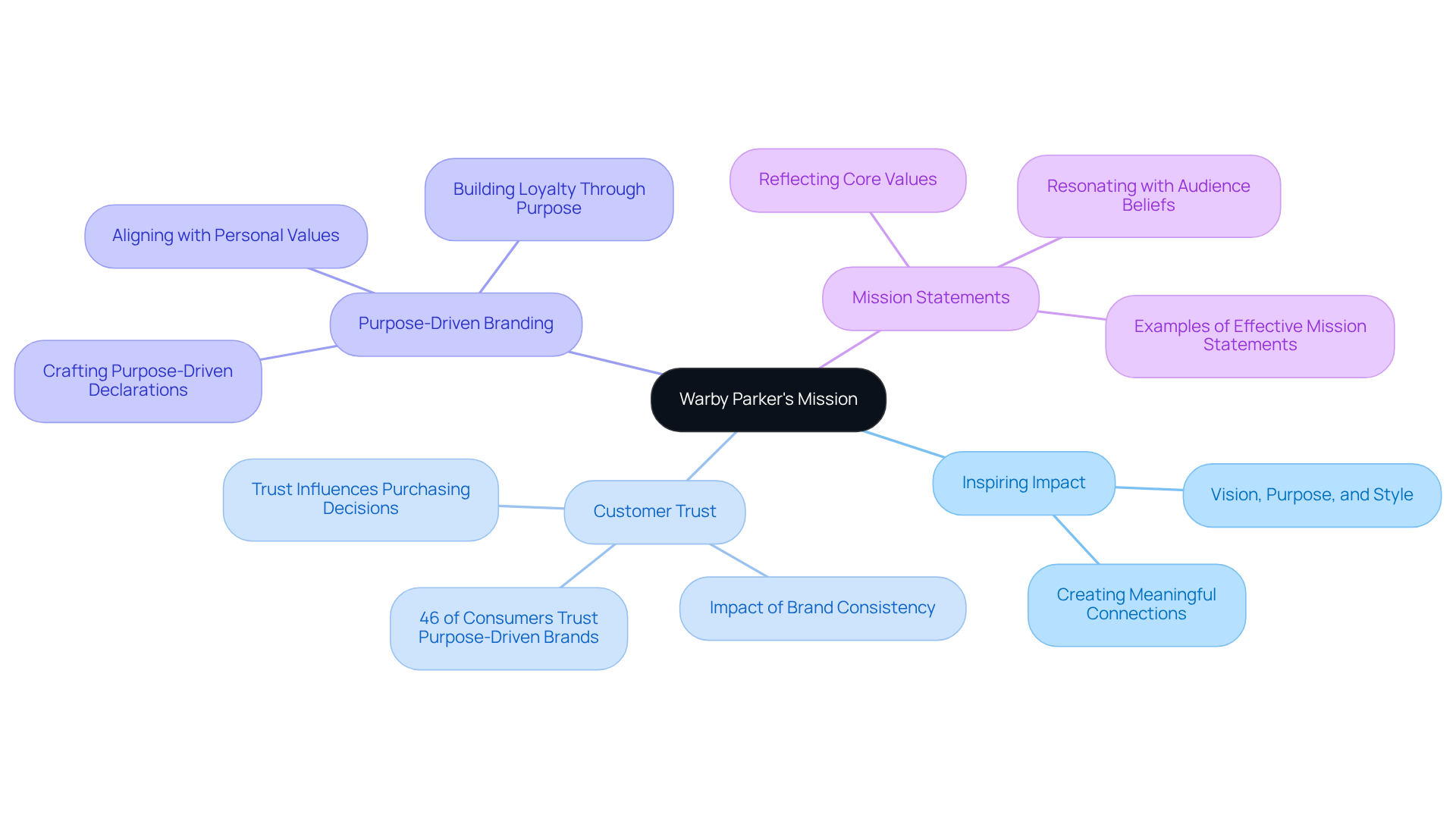
Conclusion
Exploring inspiring business mission statements reveals a crucial challenge faced by startups: the struggle to articulate a clear and impactful purpose. This challenge can lead to a disconnect between brands and their customers, leaving startups feeling lost in a competitive landscape. However, by examining the missions of companies like RNO1, Microsoft, and Patagonia, we can uncover a nurturing solution. A strong mission statement not only defines a brand's identity but also fosters deeper connections with customers, serving as a guiding principle that aligns organizational goals with the values and expectations of their target audiences.
Key insights from these examples highlight the importance of empathy, empowerment, sustainability, and innovation in shaping a brand's narrative. Companies that prioritize these elements create environments where customers feel understood and valued. For instance, Patagonia's commitment to environmental sustainability resonates with eco-conscious consumers, while Nike's focus on inspiration and innovation encourages a culture of creativity and excellence. These stories remind us that when brands embody their values, they cultivate a sense of belonging among their audience.
As startups reflect on these lessons, they are encouraged to embrace the journey of crafting their own mission statements. Emphasizing a clear and impactful purpose can differentiate a brand, driving engagement and loyalty. By aligning their missions with the values of their audience, startups can cultivate communities that are not only supportive but also passionate about their brand's journey. Ultimately, a purpose-driven approach can transform a startup into a beacon of hope and progress, inspiring others along the way. Together, we can navigate this path, creating meaningful connections that uplift both brands and their customers.
Frequently Asked Questions
What is RNO1's mission statement?
RNO1's mission statement is "Creating Radical Digital Experiences for Modern Brands," which reflects its commitment to redefining digital branding and addressing the challenges brands face in connecting with their audiences.
How does RNO1 approach digital branding?
RNO1 takes a nurturing approach to digital branding by focusing on innovative solutions that meet the evolving needs of contemporary companies and prioritizing empathy and understanding in their strategies.
What are the core values of RNO1?
RNO1 embodies core values that emphasize enhancing customer experiences, fostering engagement, and promoting sustainable growth for businesses across various sectors.
What is Microsoft's purpose statement?
Microsoft's purpose statement is "Empowering Every Person and Organization to Achieve More," which emphasizes the importance of empowerment in building a brand that resonates with diverse groups.
How does Microsoft inspire startups?
Microsoft inspires startups by showcasing the importance of empowerment in their business mission statements, fostering a sense of community, and driving engagement and loyalty among customers.
What notable achievement did Microsoft have in fiscal year 2012?
Microsoft achieved remarkable record revenues of $73 billion in fiscal year 2012, demonstrating the success of their empowerment-focused strategy.
What is Patagonia's purpose statement?
Patagonia's purpose statement is "In Business to Save Our Home Planet," which highlights its commitment to environmental sustainability and resonates with eco-conscious consumers.
How does Patagonia build consumer loyalty?
Patagonia builds consumer loyalty by aligning its values with those of its target audience and maintaining transparency in its sustainable practices, which is trusted by a majority of consumers.
What lesson can startups learn from Patagonia?
Startups can learn the importance of highlighting a genuine commitment to social responsibility in their purpose statements, which can enhance brand appeal and foster enduring relationships with customers.
Why is sustainability important for modern brands?
Sustainability is important for modern brands as it resonates with a growing demographic of conscious consumers who prioritize sustainable practices in their purchasing choices.




